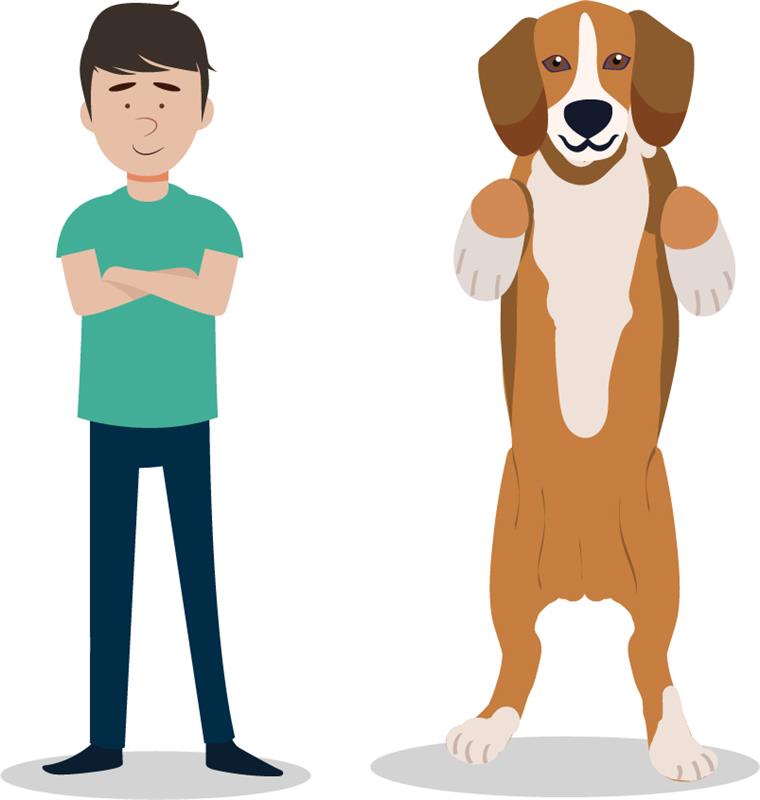Neuter dog and/or cat pros & cons

Should you neuter your pet? A question that has risen in prominence and divisiveness as modern society has emerged. Such a simple question as “should I neuter my dog” is quite complex. It raises questions on the nature of rights as it relates to the complexity of a living organism’s intelligence. It also challenges concepts of society, and whether, and to what extent, shall individuals sacrifice their individuality for the sake of social cohesion.
This article may seem one-sided but be assured it is not. Take the time to fathom that there is no scientific law for morality and ethics. At least not yet. Until then, keep an open mind, and weigh your subjective tendencies.
What does it mean to neuter and/or spay your pet?
Neutering, based on the Latin word neuter (‘of neither sex’), is the removal of an animal’s reproductive organs. Of the biological sexes that Earth is most accustomed to are the male and the female. Generally, these two categories follow similar hormone trends, physical characteristics, and behavioral profiles… among most mammals at least. In this case, we will simply be considering cats, dogs, and humans for the sake of simplicity.
Males
Males among mammals typically have higher concentrations of testosterone being produced and coursed throughout their bodies. This hormone, among some others, are produced from the testes (singular testicle).
Generally associated with the male caricature, testosterone is responsible for different emotional and physical characteristics. For emotional traits, consider masculinity, sex drive, notions of dominance, high self-esteem, motivation, energy… and on the end violence. For physicality, consider muscle mass, bone density, body hair, voice.
Testosterone also has medical implications that will be considered in the following paragraphs.
But on a more philosophical level contemplate one aspect of consciousness, and how testosterone, a simple chemical, seems to bring that out in intelligent beings through its interactions to the brain and unique neural pathways. Perhaps it’s a trigger in the way physiological energy is directed.
To neuter, a male is to castrate them. It is to remove their testes and therefore to eliminate the source of testosterone within a male. And to remove its ability to reproduce.
Females
Females among mammals typically have higher concentrations of estrogen being produced and coursed throughout their bodies. This hormone among others is produced from the ovaries.
Generally associated with the female caricature, estrogen is responsible for different emotional and physical characteristics. For emotional traits, consider competitiveness, femininity, female-orientated sex drive, notions of nurturing. For physicality, consider hair distribution, fat distribution, etc.
Estrogen, like testosterone, also has medical implications that will be considered in the following paragraphs.
But again, like testosterone, estrogen is responsible for activating another unique aspect of consciences within intelligent beings that human folk typically associate with peak femininity. They are both equal in importance but are applied in different ways.
To neuter, a female is to spay them. It is to remove their ovaries and their uteruses. To remove their sources of estrogen, and their ability to reproduce.
What is the argument for neutering your dog and/or cat?

Behavioral
These hormones are responsible for managing and regulating a lot of the emotions brains pass through. Anger, sadness, happiness, libido all are amplified by hormones in excited states. Some pet owners feel that these excited states are inappropriate and therefore are inclined to neuter their pets. This will in turn make pets calmer. They will bark less and be perceived as less of a nuisance.
Also, within the absence of neutering, pets have more energy. And are inclined to roam more. This increases the risks of an accident and death. This also increases the risk of your dog, for example, procreating with another dog and creating unwanted puppies. The average owner prefers their pet is content with staying on their property.
Population Control
There are a lot of pets without homes. Partially due to commercial overbreeding, the random breeding of animals, and run-away pets. Many people neuter their pets in an attempt to handle this issue. The idea of pet surviving in a city seems harsh, and it is. In the wild, however, some pets are better off than in cities, and may even thrive.
But the main reason for the average consumer, is they don’t want to handle so many puppies and kittens in the event of an unwanted pregnancy.
Health
Many pet owners castrate or spay their animals in hopes of improving their health. First, with their decreased sexual appetite, they are less likely to contract sexually transmitted diseases.
Second, many people neuter their dogs in hopes of reducing the probability of certain cancers rising. In males, many assume it decreases the risk of prostate cancer. While the data is complex, some studies suggest that spaying female dogs help prevent uterine infections, breast cancer, ovarian cancer, prostatic hyperplasia. These conclusions make sense, as hormones promote the growth of these organs, similar to any other animal. If estrogen promotes the growth of breasts, then breast cancer is more likely. However, this data is shaky.
But one thing seems relatively solid. A 2013 study found compelling evidence that neutered dogs lived longer. On average 0 – 2 years longer. However, Neutered dogs were more likely to die from cancer. It is reasonable to assume older pets are more likely to develop cancer and in turn, die from it.
This is a rather nuanced issue, so it is important to not pick sides when it comes to cancer rates among dogs. Also, consider that this data among dogs might correlate to trends among cats and other animals. At the end of the day, these are all mammals.
What is the argument against neutering your dog and/or cat?

Health
The data while on the surface may support the idea that neutering your pet will lower the risk of cancer, is very convoluted. And a lot of data suggests it increases the risk of certain cancers.
The “sex” hormones promote growth, the maintain the stability of certain biological systems. But eventually, this system of upkeep is bound to fail, one way or the other, neutered or not. When paying attention to cancer within the sex organs, like the uterus and the prostate, consider the fact that these systems are simply being managed by hormones.
There is more data on prostate cancer among dogs and a correlation with the status of being neutered or not. According to veterinary cancer specialist Dr. Greg Ogilvie, prostate cancer among dogs, while still being more prevalent compared to other species, is still rare. A study from 2002, however, showed that prostate cancer is actually at a higher risk of developing among neutered pets.
Cancer is a very complex problem, and by disrupting the natural hormone environment within pets, you may increase the probability of certain cancers.
There is more and more data suggesting that neutering is a cancer risk. For example, bone cancer and cardiac hemangiosarcoma are more likely. With the lack of certain hormones, bone can become more fragile, and pets are more likely to develop skeletal issues and other orthopedic hindrances.
There are a plethora of more diseases that are increased in risk when neutered, such as chronic vaginitis, autoimmune thyroiditis, hypothyroidism, cranial cruciate ruptures, etc.
And It is important to consider, cancer rates among pets may be higher, due to the significant amount of artificial interbreeding and purebred animals. Almost every dog you see has been engineered by a human. And as a result, genetic diseases, physiological issues, and deformities are prevalent. For example, pugs suffer from severe breathing problems.
Disrupting the natural flow of hormones also saps your pets of energy. Just like a human with medically low levels of testosterone or estrogen, pets can experience a decreased metabolic rate. This combined with the fact hormones are no longer protecting muscle proteins, brain synapses, and bones, pets become lazier. And as a result, much fatter. And like humans with hormone issues, may suffer from emotional issues like depression.
That’s why many owners who lead active lifestyles, like hikers and golden retrievers, refrain from neutering their pets.

Behavioral
Many owners neuter their pets in hopes of making them calmer. However, proponents of keeping pets intact argue this is inhumane. As aforementioned, removing sources of hormones decreases metabolic rates. This logic, compared to the fact physiological issues arise in humans with below-average hormone levels, questions how pets are feeling.
Some make the case behavioral issues are not being treated but ignored. Technically, among humans who take steroids, emotional flaws are only exacerbated, not generated. A human who has anger management issues will experience more anger issues on artificially high levels of testosterone. But those who are more collected intrinsically may feel the same.
90% of American male dogs are neutered. Whereas in the UK, only 54% are neutered. Some European nations consider it inhumane to neuter your pets and it is illegal. Under Norway’s Animal Welfare Act, neutering is a procedure allowed under very peculiar circumstances. And because of it, 93% to 99% of dogs are left intact.
That’s why some advocates preach society should treat our dogs and cats differently. America mostly. Many times, Americans look to compare their societies to the likes of European societies. One thing many travelers point out is how well behaved their pets are.
In Europe, it is rude to interact with strangers dogs. People will often find them without leashes. And they are often left outside of restaurants, tied to designated dog posts. Where they are calm and quiet. Maybe playing around a little bit, but not with humans. They are allowed inside businesses and intact dogs are simply not a big deal.

Population Control
Some argue this is a responsibility issue, perhaps even a cultural one. And that pet overpopulation is not an issue in Europe due to how owners take care of their pets.
Other arguments seem much harsher. Some make the case these are animals and will fare well in the wild. This is semi-accurate, but dogs can only survive so long in the wild by themselves. You have to consider that they function in packs. And most of the overpopulation issue is in the urban centers, where “nature” is rare.
At the same time, people argue that these animals deserve rights. They might believe humans play to much “god” and shouldn’t account for the free will breeding of animals by removing a part of their biology.
In places like India, stray dogs are taken care of by the community. Families leave food out, and dogs return as a pattern. They may even play around with the neighborhood kids.

Conclusion
Should you neuter your pets? No one knows for sure.
On one hand, America, a profit-driven society hell-bent on productivity. Where many people simply don’t have the time to monitor and manage their pet’s health, consider its training, and so on.
And as a result, pets are rampant, over-populated, poorly trained. A simple solution to this is to neuter them. And here, the culture doesn’t value the supposed autonomy of an animal, whether it is morally righteous to leave the gonads intact, and whatever else.
On the other hand, you have eastern societies, most of them. And within the scope of this article, Europe: the UK, Norway, others like it. Where pets are mainly left intact, and behave perfectly fine. The culture there has adapted to make sure dogs are well trained, and strangers treat them accordingly.
But back to America, where it might lack in a unifying culture, it overcompensates with a desire to solve problems. To neuter can be seen as a necessity, as we deal with the consequences of overpopulation, lackluster breeding, and shortened lifespans.
But with innovation in biotechnology, artificial intelligence, automated healthcare, and pet management, perhaps we can envision a world where neutering doesn’t have to be seen as a necessity.
Should animals be left alone? Do humans as intelligent species have the right to dictate the health of our animals? Do animals have rights? Is it ethical for them to handle their survival and health regardless of their limited understandings? There are so many questions and so many different answers. At the end of the day, it’s all up to you and what you think is right.

What does Salutus have to offer?
Salutus is interested in making family life easier with technology. And pets are a part of anyone’s family. Regardless if you choose to neuter your pet or not, we aim to provide solutions that make caring for them simple.
As of now, we have the Knomi Panic Button GPS Tracker Device to offer. This device can be attached to our collar, and be used as a pet tracker. With 6 months of battery life, you can be relaxed about the safety of your animal.
Neutered or not, pets love to roam. However intact pets move around more. So consider Salutus as an option.
But Salutus is not just a GPS company, it is simply one early product in an ecosystem of devices. In the next few years, as Salutus grows, so will our capabilities. We will innovate in pet health care with devices, bio-sensors, and artificial intelligence. Along with the rest your family, caring for your pet will become exponentially more affordable.
Links
These are similar articles that have different viewpoints. Read them as you please. There also some other links that delve into topics that aren’t necessarily for pets, but may provide context.
- https://www.understandinganimalresearch.org.uk/news/research-medical-benefits/neutering-and-cancer-the-good-the-bad-and-the-ugly/
- Do Spayed and Neutered Dogs Get Cancer More Often? – Scientific American Blog Network
- Five Good Reasons Why You Should Spay or Neuter Your Pet
- Genetic diversity, inbreeding and cancer
- To neuter your dog or not? New studies change answer for some – The Denver Post
- Spay/Neuter Your Pet | ASPCA
- Spaying and neutering | American Veterinary Medical Association
- https://www.webmd.com/women/guide/estrogen-and-womens-emotions#1
- https://www.healthline.com/health/womens-health/benefits-of-estrogen#risks
- https://www.yourhormones.info/glands/testes/#:~:text=What%20hormones%20do%20the%20testes,known
%20as%20the%20Leydig%20cells. - https://en.wikipedia.org/wiki/Neutering#:~:text=Neutering%2C%20from%20the%20Latin%20neuter,or%20a
%20considerably%20large%20part.&text=The%20male%2Dspecific%20term%20is,often%20referred%20to%20as%20fixing.


